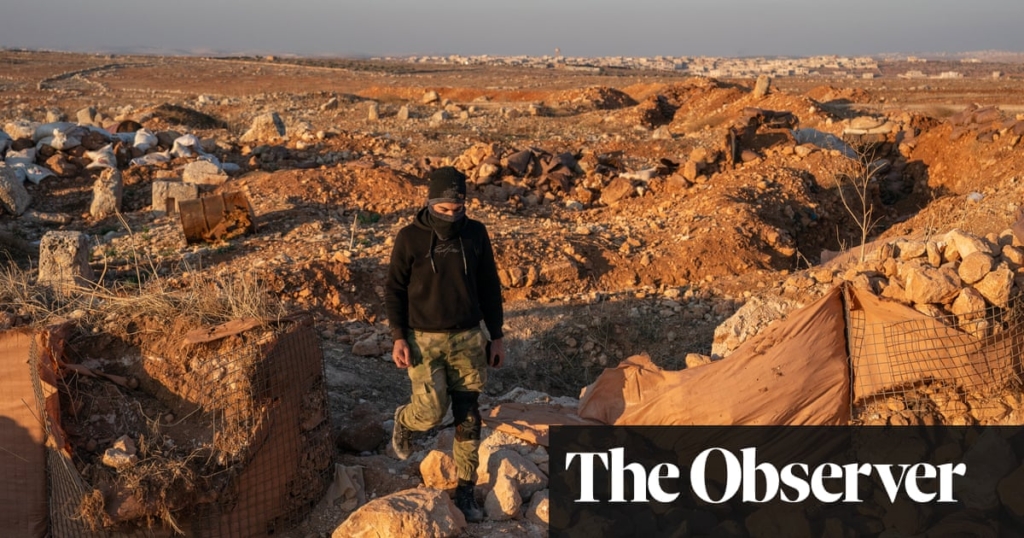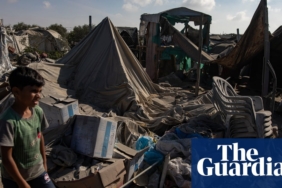Bu içerikte, Suriye’deki savaş ve isyankarların hikayesi anlatılmaktadır. Kuzey Fırtınası Tugayı’nın komutanı olan Abu Obeida’nın yaşadıkları ve yaşadığı çatışmalar ele alınmaktadır. Obeida’nın savaş sırasındaki deneyimleri, çatışmaların nasıl başladığı ve ilerlediği hakkında bilgi verilmektedir. Ayrıca, savaşın şiddeti ve sonuçlarına dair detaylar da içerikte yer almaktadır. Obeida’nın gelecek kaygıları ve yaşadığı belirsizlikler de vurgulanmaktadır. Bu içerik, Suriye’deki savaşın yıkıcı etkilerini ve savaşın gerçek yüzünü gözler önüne sermektedir.
[ad 1]
Kaynak: www.theguardian.com
Abu Obeida, the commander of the Northern Storm Brigade, left his mud-camouflaged Toyota running as he got out to inspect the dirt road running through the no man’s land that separated his rural base north west of Aleppo from a Hezbollah position 200 metres away.
A month ago, this front against the Lebanese group was where the Islamist rebel offensive that changed Syria for ever began. The 25-year-old’s unit was supposed to sweep for landmines and unexploded ordnance among the olive groves in the aftermath of the opposition’s stunning 12-day rout of Bashar al-Assad and his Russian, Iranian and Lebanese allies. It quickly became apparent that, amid many other more pressing tasks, his people hadn’t been thorough enough.
Pulling on the trip wire lying across the track, Obeida pressed down lightly on a patch of soft red earth at the side of the road with his boot, then used his bare hands to uncover and disable a landmine that could have blown off his arm or the front half of the truck. Grinning, he climbed back into the driver’s seat. “Be careful when you get out. Follow in my footsteps,” he said. It was the first of several armed mines the commander found that day.
On a cold but sunny December afternoon, Obeida – real name Ahmad Abdo al-Salam Qaranfel – gave the Observer an insight into how the battle for Aleppo unfolded, taking us to the base where the campaign started. The northern Syrian city, the closest to the last rebel-held pocket of the country, was the first target of the Hayat Tahrir al-Sham (HTS) led-offensive.
Three months earlier, the Turkish-backed Northern Storm Brigade, once an enemy of HTS, was one of many smaller religious rebel groups brought onboard for the new campaign to oust the regime after 13 years of war and four of stalemate. But even though the front lines froze in 2020, when Turkey and Russia brokered a ceasefire between Assad’s forces and various rebel groups, Obeida and his men had kept busy.
At the Northern Storm staging post near the village of Tamura, opposite a Hezbollah unit, the brigade dug out roads for heavy vehicles, as well as huge underground caves that could sleep hundreds in rudimentary conditions. The kitchen was little more than a camp fire, and water from a tank was strictly rationed. Tunnels linked several chambers, the entrances hidden from enemy drones by netting. Some sloped up to machine gun and sniping positions; others extended 200m east, right up to the Hezbollah front.
Hezbollah, holed up on a farm opposite, knew the brigade was building underground, Obeida said, but did not know when the offensive that broke the four-year ceasefire would come. Troop and heavy weaponry buildups in the weeks before the attack did not appear to faze the Lebanese fighters, and when the operation began on 27 November, they were quickly overwhelmed.
Northern Storm fired an opening salvo of 40 rockets at Hezbollah. Simultaneously, pick-up trucks, mounted with .50 calibre machine guns, roared up to outposts on roads protected by 3m-high earth berms, forcing the group to retreat to the farmhouse and a water tower. Two hundred infantry armed with rifles and RPGs then emerged from the tunnels.
Obeida’s three brothers, also brigade commanders, joined him in the fight. Khaled, 26, was killed in the battle; Obeida said he was shot directly in the chest.
“It wasn’t easy … They fought well for about two hours. We killed 40 of them and the remaining 100 fled,” he said. He showed grisly footage on his phone of bloodied corpses slumped against a wall, all wearing fatigues emblazoned with Hezbollah’s yellow and green insignia.
The unit under Obeida’s command pushed on after storming the Hezbollah base to a road leading to Aleppo city. In total, about 70 villages and posts fell under the HTS-led umbrella’s control over the next two days, until the rebels reached the western outskirts of the city.
Government troops fled, while fighters from the Kurdish-majority People’s Protection Unit (YPG) retreated to the northern neighbourhoodsof Sheikh Maqsoud and Ashrafiyeh. Both the regime and Russia launched air strikes in an attempt to stymie the rebels, but with little resistance on the ground, within a day HTS had captured most government and military installations in the city, as well as the symbolic ancient citadel in Aleppo’s heart.
Obeida was at the scene of an airstrike on the Basel roundabout that killed at least 15 civilians, he said. “The road to the hospital was blocked. We tried to treat people on the street, in cars, but without proper help they died.”
The offensive’s planners had estimated that the battle for Aleppo would take six months, and the campaign would take two years to reach Damascus, the commander said. Instead, the regime and its allies folded like a house of cards. Aleppo was won in a day, Hama, a few days later, Homs three days after that. The capital, Damascus, fell within the next 24 hours, as exhausted Syrian army conscripts and jaded officers caved in the face of the rebel march south.
The return of rebel fighters in Aleppo, eight years after the end of the battle for the city, is bewildering for residents and militants alike. Obeida grew up just 25km away from the city, in a village called Atarib, but had never been there before; he is not used to city traffic, and finds driving there difficult. A doorman at the entrance to a hotel who asked him to check his pistol into the cloakroom was met with a befuddled stare.
“I think the people think we are terrorists. They are afraid of us,” he said. “We are guided by God, but we understand that not everyone is Muslim or thinks the same way.”
There are deep concerns that HTS and its allies will impose an illiberal brand of Islamist rule on Syria. The more pressing issue may actually be whether HTS can keep its unlikely alliance of rebel groups together, or whether there will be a return to warfare.
after newsletter promotion
Obeida put it bluntly: “If HTS do not deliver on their promises of money and jobs, we will go back to fighting them,” he said.
The commander was just 12 years old when Syria’s Arab spring uprising morphed into civil war; he was 15 when he picked up a gun. His is the second generation of Syrians caught up in war. “Resistance is not a choice. This life was not my choice,” he said.
Assad’s forces reconquered Atarib, his home, in 2020. The Northern Storm Brigade then lost more than half of its 20,000 men battling HTS, which was seeking to consolidate its control of north-west Syria.
Obeida and his family eventually settled in Azaz, on the border with Turkey, part of a strip of northern Syria the Turkish state occupied in 2016 in a new chapter of its decades-long fight against Kurdish groups.
At face value, Northern Storm’s decision to make peace with HTS and join the renewed push against the regime makes little sense, and Obeida changes the subject when it is brought up. “We had no choice but to trust them,” he said.
The 25-year-old is also clear-eyed about Turkey, which pays his salary, and has partial administrative authority over Azaz, where his parents, wife and seven-month-old baby girl live.
“I am paid $85 every 45 days. My men make $65,” he said. “The Turks don’t actually care about us and our cause, they just use us when it is convenient.”
Obeida is delighted by how quickly he and his men helped to overthrow Assad. At the same time, he is troubled by what the future holds for him and his young family.
“I am not educated, I don’t know how to do anything else except fight. I want to have a new role in a new Syria … but I don’t know what that is,” he said.





Yorumlar kapalı.